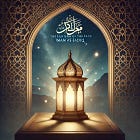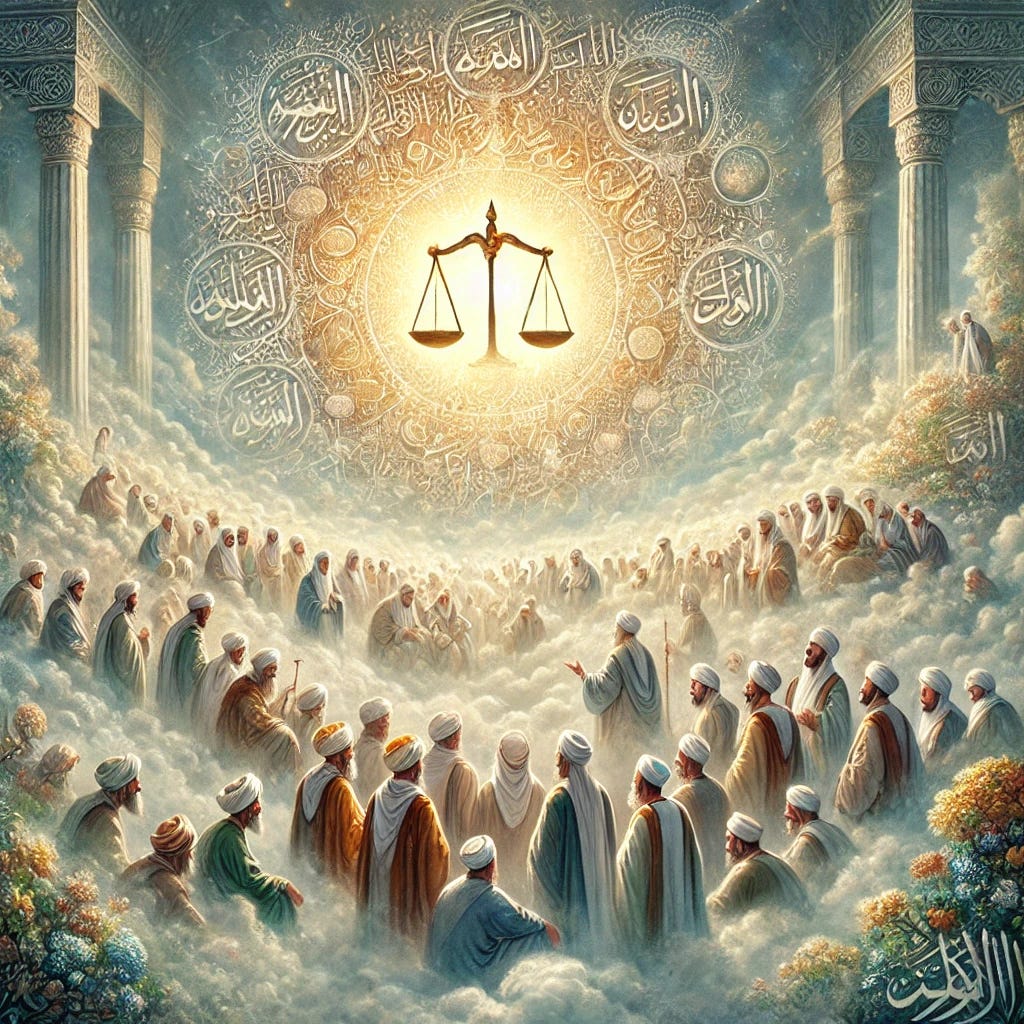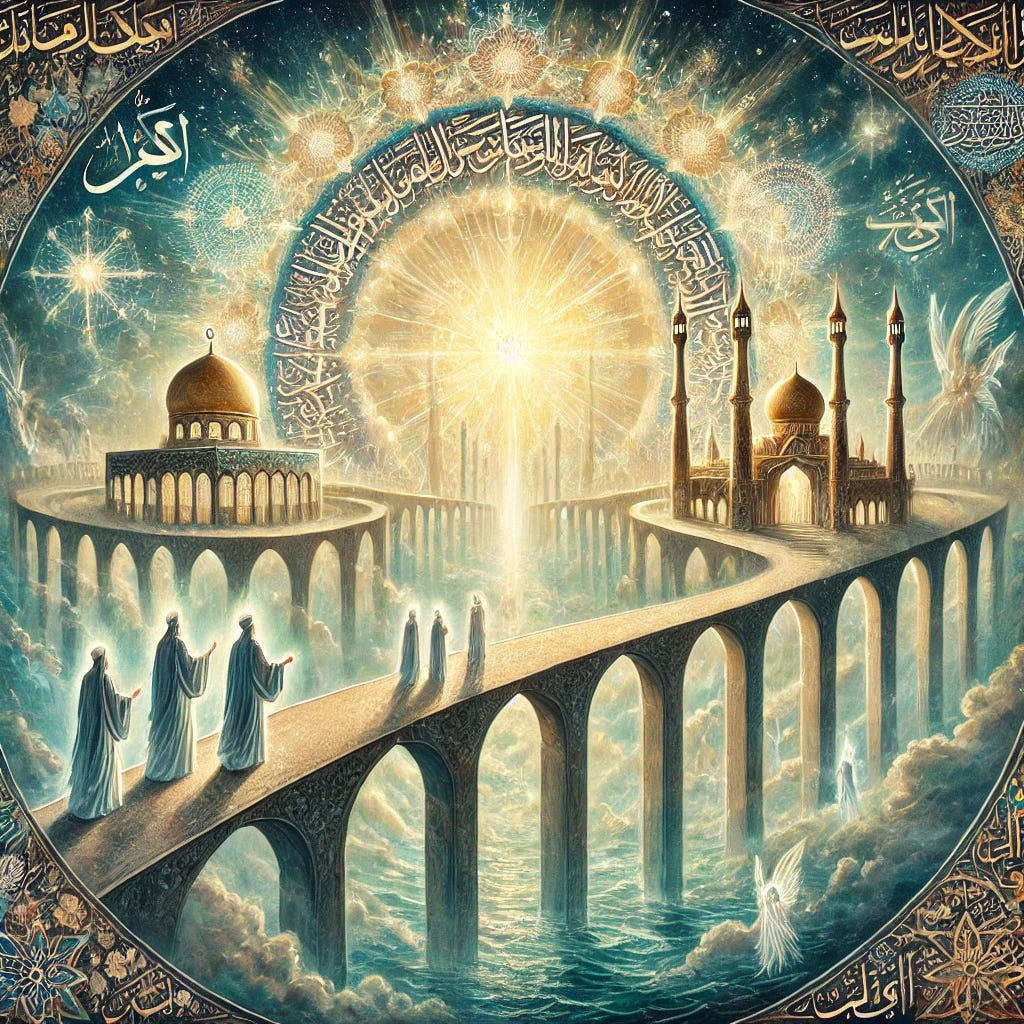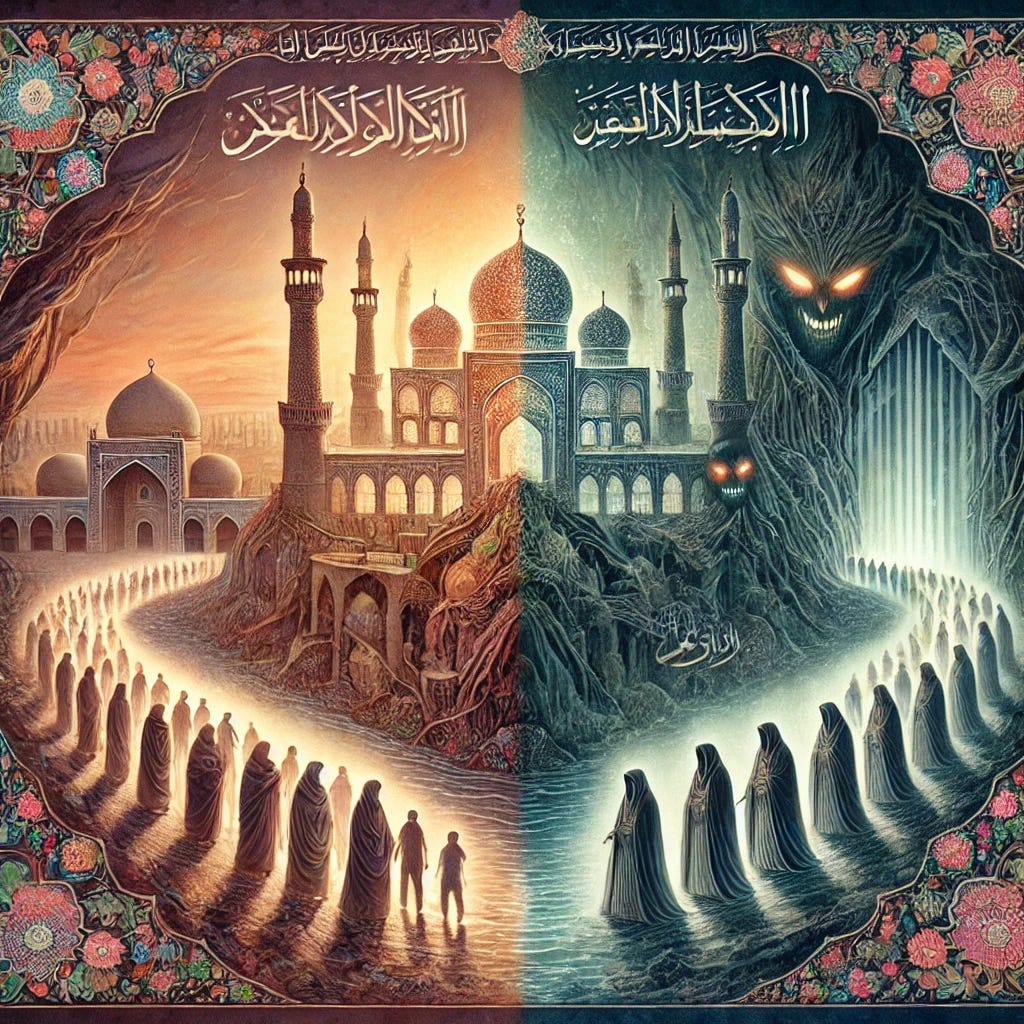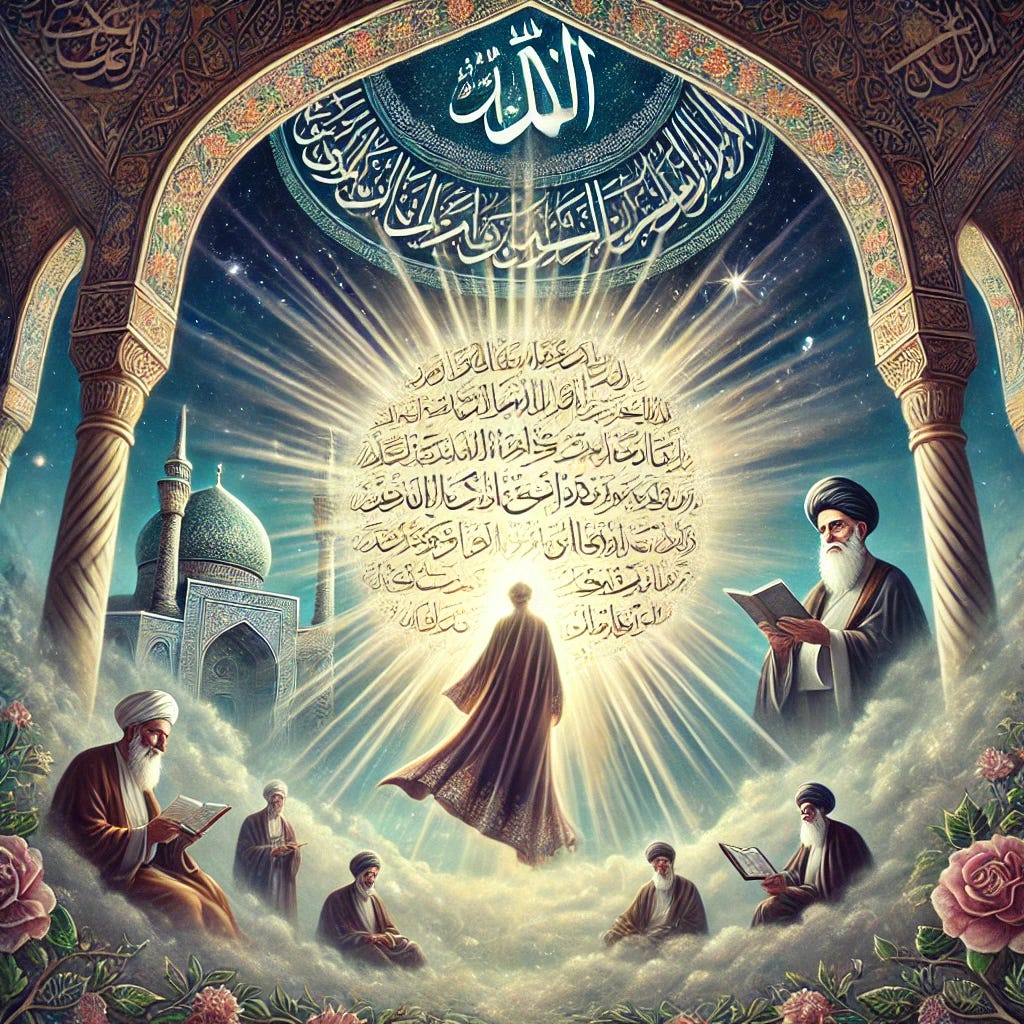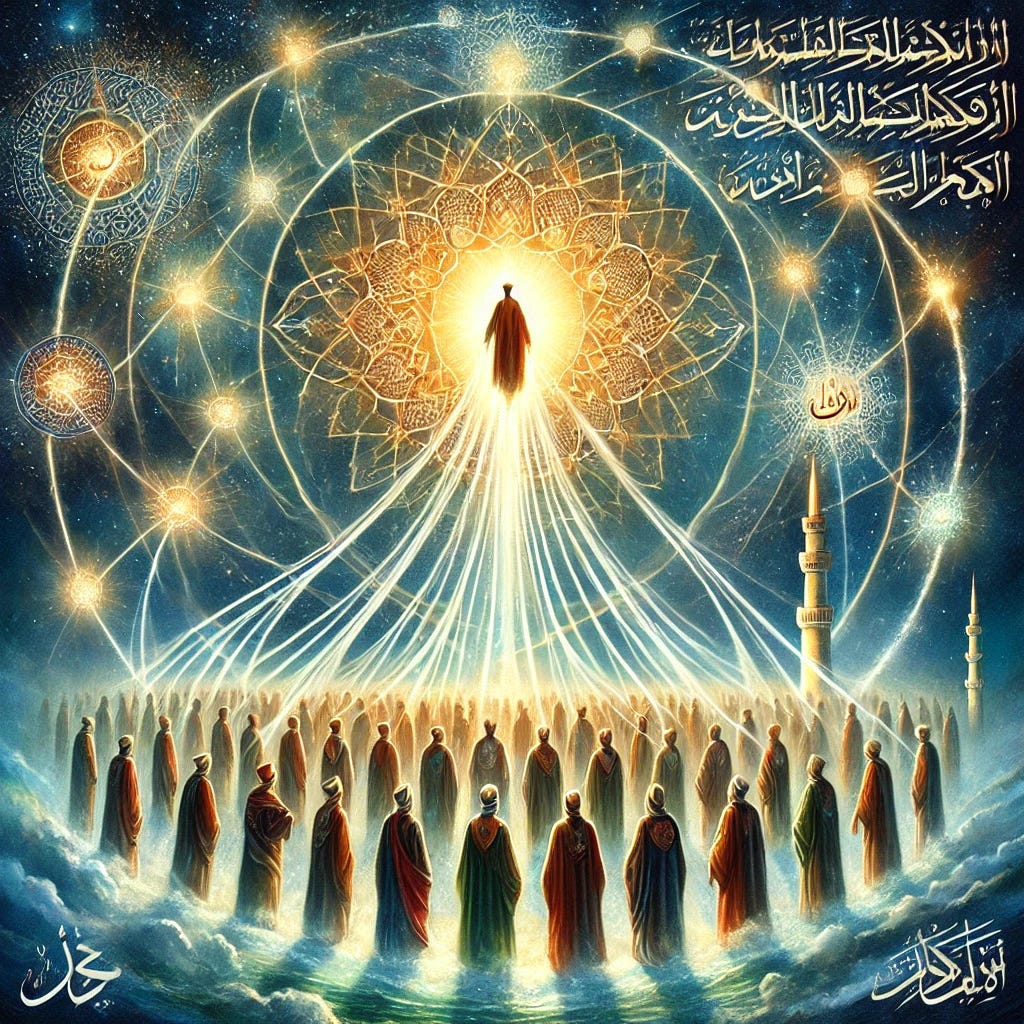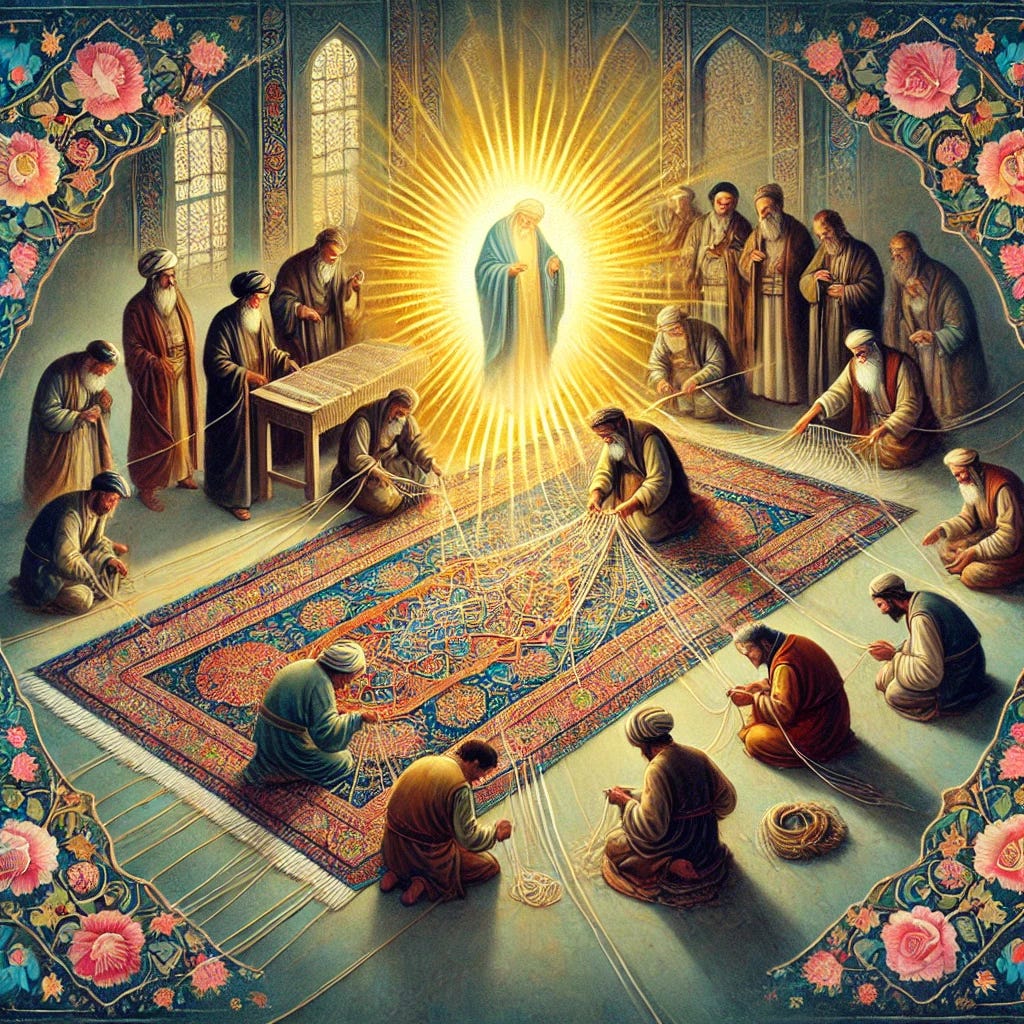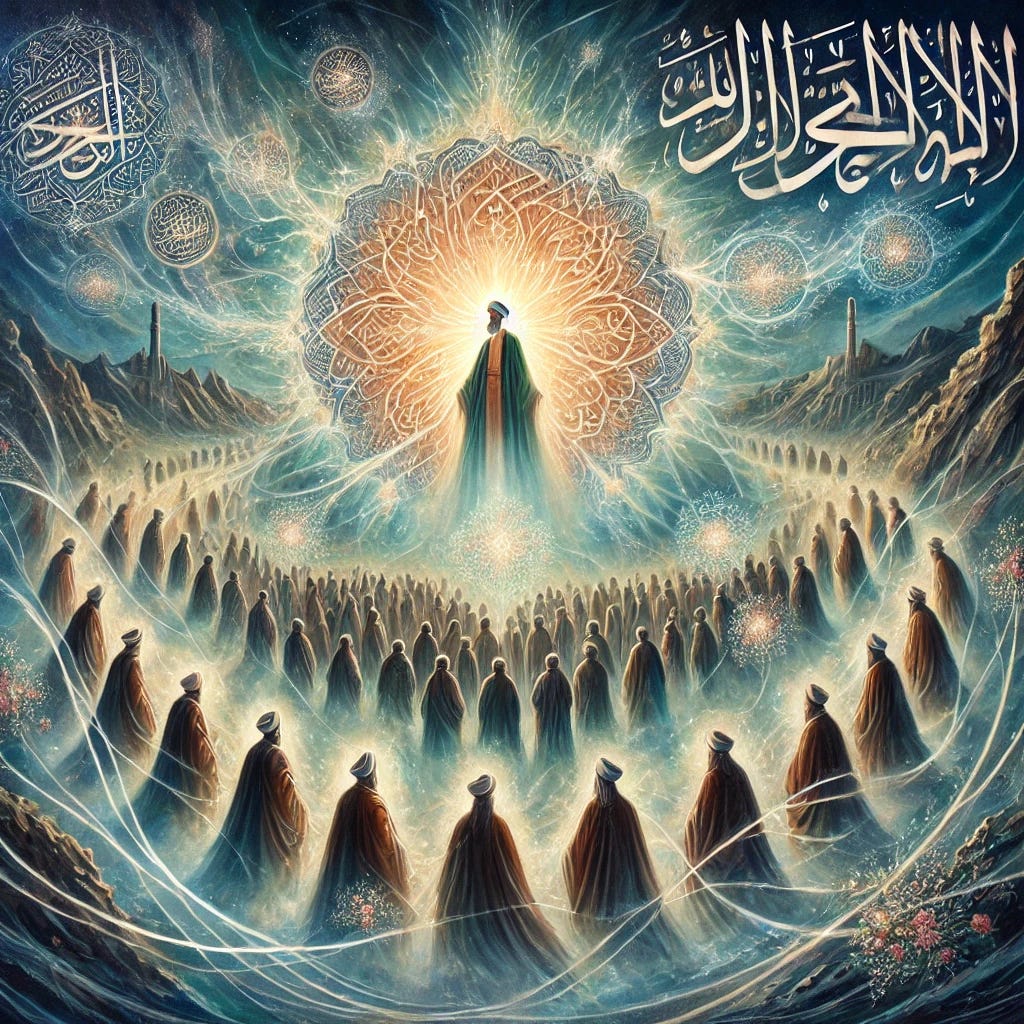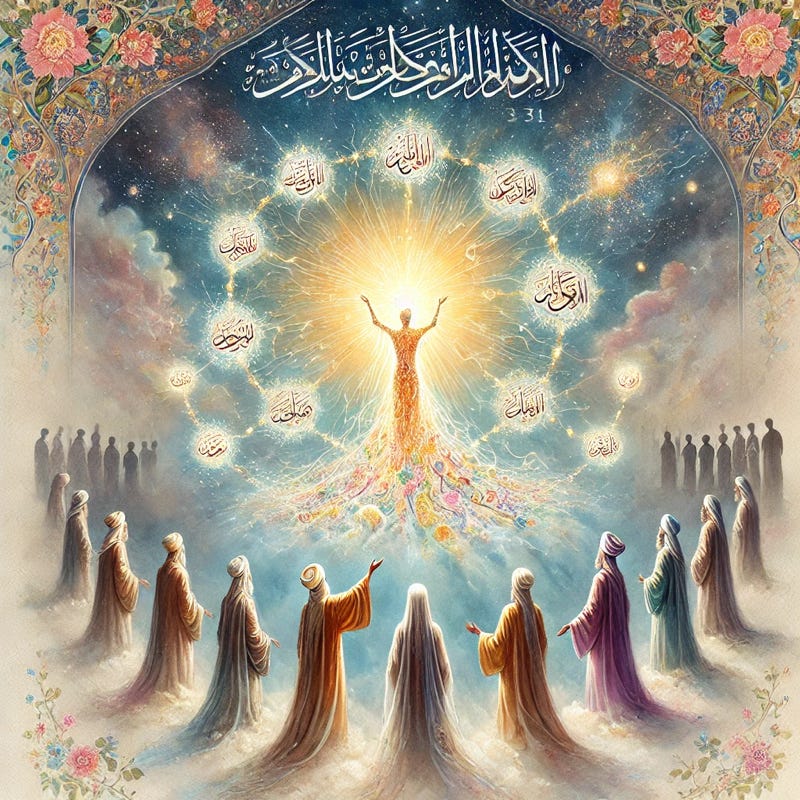[16] Wilayah - The Quranic Concept of Wilayah
A series of discussions on the teachings of Imam Sadiq (sixth Imam of the Muslims), from the book Misbah ash-Sharia (The Lantern of the Path)
In His Name, the Most High
This is part sixteen of an ongoing series of discussions on the book by Imam as-Sadiq titled ‘Misbah ash-Sharia’ (the Lantern of the Path).
This is the second of our discussions on the subject of Wilayah or Guardianship/Authority.
It is strongly recommended that the previous parts are read, before proceeding with this one; to avoid any confusion or misunderstanding within the subject matter.
The nature of the subject matter, and the style of discourse requires that each part build upon those that came before it, so once more, I strongly recommend that the reader, read the previous parts, and then continue with this one.
The previous parts, can be found here:
Video of the Majlis (Sermon/Lecture)
This write up is a companion to the video majlis (sermon/lecture) found below:
Contents
Majlis - Misbah ash-Sharia - Servitude - Part 16
Nasheed: An Ode to Lady Khadija - Sayyed Mahdi Mir Damad - Farsi with English subtitles
Dua: Dua al-Iftitah - Ali Fani
Ziyarah: Ziyarat Aal-i-Yaseen
Recap
Over the course of our discussions, we have explored the foundational themes of servitude (Ubudiyyah) as taught by Imam Ja’far as-Sadiq in Misbah ash-Sharia (The Lantern of the Path).
Our journey began with understanding Tawheed (Monotheism), Adalah (Divine Justice), and Nubuwwah (Prophethood), all of which have built the necessary groundwork for our current discussions on Wilayah (Guardianship or Authority).
Wilayah is not separate from Prophethood but rather its essential continuation. Without wilayah, the very institution of Prophethood remains incomplete. As we have learned, wilayah is not merely about love for the Imams but a deep and unwavering commitment to leadership, governance, and the preservation of faith within society.
There were a number of key take-a-ways from our previous session:
Wilayah as a Divine Principle – It extends from God’s absolute authority to the leadership of His chosen representatives.
Wilayah and Society – The Prophet did not simply build a faith of individuals but established a Tawheed-oriented community governed by divine principles.
Wilayah and the Survival of Faith – Throughout history, wilayah has served as the fortress of faith, ensuring the unity and endurance of the believers despite persecution.
The Quranic Command for wilayah – We explored Surah al-Mumtahinah (the Chapter of the Woman to be Examined) #60 Verses 1-6, and other verses that highlight the necessity of aligning oneself with God’s chosen authority while disassociating from the forces of falsehood.
We also reflected on historical examples, including the sacrifices of Yahya ibn Umm Tawil and other companions of the Imams, whose steadfastness preserved the essence of wilayah despite immense trials.
This discussion on Wilayah is far from over. In the coming sessions, we will:
Deepen our understanding of Wilayah through further Quranic and historical insights.
Examine the lives of the Twelve Imams, following the framework of The 250-Year-Old Man as discussed by Imam Khamenei.
Explore the contemporary relevance of Wilayah, including its role in leadership, Marjaiyyah, and the broader geopolitical landscape.
As we move forward, we ask God to grant us wisdom, perseverance, and clarity, so that we may truly understand and adhere to wilayah in its fullest sense.
In His Name, we continue …
Wilayah (Guardianship or Authority) - Part 2
Introduction
يَا أَيُّهَا الَّذِينَ آمَنُوا لَا تَتَّخِذُوا الْيَهُودَ وَالنَّصَارَىٰ أَوْلِيَاءَ ۘ بَعْضُهُمْ أَوْلِيَاءُ بَعْضٍ ۚ وَمَن يَتَوَلَّهُم مِّنكُمْ فَإِنَّهُ مِنْهُمْ ۗ إِنَّ اللَّهَ لَا يَهْدِي الْقَوْمَ الظَّالِمِينَ
فَتَرَى الَّذِينَ فِي قُلُوبِهِم مَّرَضٌ يُسَارِعُونَ فِيهِمْ يَقُولُونَ نَخْشَىٰ أَن تُصِيبَنَا دَائِرَةٌ ۚ فَعَسَى اللَّهُ أَن يَأْتِيَ بِالْفَتْحِ أَوْ أَمْرٍ مِّنْ عِندِهِ فَيُصْبِحُوا عَلَىٰ مَا أَسَرُّوا فِي أَنفُسِهِمْ نَادِمِينَO you who have faith! Do not take the Jews and the Christians for allies (awliya): they are allies (awliya) of each other. Any of you who allies with them is indeed one of them. Indeed God does not guide the wrongdoing lot.
Yet you see those in whose hearts is a sickness rushing to them, saying, ‘We fear lest a turn of fortune should visit us.’ Maybe Allah will bring about a victory, or a command from Him, and then they will be regretful for what they kept secret in their hearts.- Quran, Surah al-Maidah (the Chapter of the Table Spread) #5, Verse 51 to 52
In this session, we will be building upon what we have learned about wilayah from our introduction to the subject, and will try to understand what is necessary about wilayah for our day and age.
If we want to create an Islamic society - a tawheed-oriented society - or a community called the ‘Islamic Ummah’ - meaning that we want to govern this society in accordance with the divine decrees, divine thought processes and divine legislation, and implement these laws and decrees through God’s power and authority.
The society that we call the ‘Islamic Ummah’ must have wilayah, in the sense that we extracted an understanding from the Quran in our previous session, and that we will continue to explore the proper meaning of this term gradually through these sessions.
We are not interested in the idea that most ordinary people have about wilayah.
We are interested in wilayah as understood by the scholars and sages who are familiar with the teachings of Islam and Shi’ism. That is what we are going to discuss, God willing.
The Quranic Concept of Wilayah
However, right now, we are talking about the Quranic concept of wilayah.
If we want to grasp the Quranic notion of wilayah, and secure for the Islamic Ummah this notion of wilayah, as it is laid out in the verses of the Quran, then we must pay attention to two aspects in particular.
One aspect is that of internal relations within the Islamic society.
The other aspect is that of external relations, or the relation of the Islamic world, the Islamic society and the Islamic Ummah with other societies.
The Quranic Concept of Wilayah - Internal Relations
With regard to internal relations, when the Islamic Ummah has wilayah in the sense laid out by the Quran, this means that they are joined to one another and united together to the greatest extent possible, encompassing all individuals and wings of the community.
In other words, there should be no division or disagreement anywhere within the great Islamic Ummah. There should be a single cohesive whole.
In the event a war breaks out between two parts of the Islamic Ummah, for example let us imagine that a war breaks out between a group in the eastern Islamic lands and a group in the north-east, then the general principle is as follows:
The remainder of the Muslims must do everything in their power in order to bring about peace between the two groups.
If they see that, of these two groups, one is willing to make peace and the other is not, or that the position of one side is unjust while the position of the other side is right, and those on the side of wrong are not willing to listen to the side of right.
Then in this situation, the entirety of the Muslim world must be united in taking action against the side which is unjust and must put them in their proverbial place.
وَإِن طَائِفَتَانِ مِنَ الْمُؤْمِنِينَ اقْتَتَلُوا فَأَصْلِحُوا بَيْنَهُمَا ۖ فَإِن بَغَتْ إِحْدَاهُمَا عَلَى الْأُخْرَىٰ فَقَاتِلُوا الَّتِي تَبْغِي حَتَّىٰ تَفِيءَ إِلَىٰ أَمْرِ اللَّهِ ۚ فَإِن فَاءَتْ فَأَصْلِحُوا بَيْنَهُمَا بِالْعَدْلِ وَأَقْسِطُوا ۖ إِنَّ اللَّهَ يُحِبُّ الْمُقْسِطِينَ
If two groups of the faithful fight one another, make peace between them. But if one party of them aggresses against the other, fight the one which aggresses until it returns to God’s ordinance. Then, if it returns, make peace between them fairly, and do justice. Indeed God loves the just.
- Quran, Surah al-Hujuraat (the Chapter of the Chambers) #49, Verse 9
The Quran clearly says:
“If two groups of the faithful fight one another, make peace between them. But if one party of them aggresses against the other, fight the one which aggresses, until it returns to God’s ordinance.”
This is what God has decreed with regards to maintaining unity amongst the Muslims.
The Quranic Concept of Wilayah - External Relations
As for external relations, the Islamic world must try to organise its relations with the non-Islamic world and the world that is not part of this Ummah (community) so that it does not even fractionally fall under the latter’s control, or even fractionally fall under the influence of its ideas.
In short, it must pursue a policy of independence, and it cannot achieve independence under the influence of the latter’s policies.
Muslim nations should not be allowed to pursue unity or cooperation with those nations if this leads the Muslim Ummah to fall under their influence and control.
There is a famous story on this topic. We will not go into the full details here, but there is a narration mentioned in the reliable books of Shia traditions.
The Importance of Self-Reliance
This story dates back to the time of either Imam al-Baqir, the fifth Imam of the Muslims, or Imam as-Sadiq, the sixth Imam of the Muslims, when the Muslim world typically used Roman coinage.
The Roman’s threatened to cut-off this supply of coins, and the Muslims were left helpless.
At this point, the Imam advised the Caliph to do something.
This is a very strange event, an exceptional situation that only occurs once or twice in history, where we see the Imam helping the Caliphate! This is one such event.
The Imam advised the Caliph to strike his own coins.
Now, the Muslims didn’t know how to mint their own coins, what dimensions or weight they had to be, where or how to obtain the precious metals to make them, for example, whether to mint one dirham, half a dirham, and so on.
The Imam instructed them in all of this.
Therefore from the perspective of external relations, it is forbidden to even come fractionally under the influence of non-Islamic and especially anti-Islamic powers.
The Islamic society and the Muslim Ummah do not have the right to form relations with the non-Islamic world, except, from a position of strength and superiority.
In other words, the connection between the Muslim Ummah and the non-Muslim world should never be based on exploitation, as, for example, we saw with the Tobacco monopoly during the Qajar times in Iran.
The Islamic world has no right to form such agreements.
The Prohibition of Reliance on Foreign Entities and Powers
Or for example, as the Mughals did in India, where they allowed foreign powers to come and create companies, which then were able to act against the wilayah of the Muslim world.
They should not have allowed such companies to come - whether they knew what would happen or not, and they should have known - like the British East India Company who, when they came to India, what devastation they wrought on the region and its peoples.
Their heinous activities ultimately culminated in the establishment of the British colonial power in the Indian Subcontinent.
The Mughals should have known better, but they did not.
The Muslim world must never again allow such relations to form.
Indeed, in this regard, it is the position of Imam Khamenei, that when he says that such relations with non-Muslim and non-Islamic nations need to be severed, he does not mean that the Muslim world needs to withdraw from the rest of mankind.
No, he insists that this is not a question of political isolation, such that you might imagine that the Muslim world has no trading, political, or diplomatic relations with other nations - no this is not what he - Imam Khamenei - means.
There should be normal relations.
And now this is very important - what this - normal relations - means is that there should not be wilayah with them - with the non-Muslim world - there should not be unity with them. There should not be an essential connection with them.
It should not be such that they - the non-Muslim world - are able to spread their influence through the Muslim world.
Two Aspects of Wilayah from the Quranic Perspective
Hence, wilayah has two aspects from the Quranic perspective:
The interior aspect, which pertains to relations within the Islamic society, whereby every element of that society must be directed towards a single goal, follow a single path, and move with one step.
Then, the exterior aspect, which pertains to relations with other societies, whereby the Muslim world does not allow itself to fall under the influence of any non-Islamic bloc or movement.
Here, there is a subtle point that needs to be made, the point being that, wilayah in the sense it is used in the Quran, is the same sense as we, the Shia, use it.
The Shia Concept of Wilayah
Please pay very close attention to my explanation - which is from Imam Khamenei’s explanation - of this, so that you can grasp how the Shia concept of wilayah relates to the Quranic concept of wilayah.
It is possible, that a few people, or perhaps a previous generation, were ready to blindly accept some of the things they heard about wilayah. However, a young person who wants to understand the meaning of this term and how it derives from the Quran must pay close attention in order to understand from whence ‘wilayah’ in the Shia sense originated.
The Importance of Our Relationship with the Imam
When we say that our relationship with the Imam is so important, when we say that the Imam has the right to direct all aspects of our social life, why is this?
Where does this come from?
This is what the Quran says to us:
If we want to create a society or nation in which the Quranic notion of wilayah exists, in the sense that we want all of the internal capabilities of that society to be directed towards a single purpose and a single goal, and we want that society to follow a single path, and for all of its strength to be mobilised against the external anti-Islamic powers.
Then, there must be a point in the fabric of that society in which those powers are concentrated, a point to which all of these powers are connected, from which all of these powers take inspiration and direction, a point that is aware of the best interests of the society, and which, like its powerful and farsighted commander, can issue orders to each individual on the battlefront.
There must be a leader, a commander, a central power in Islamic society who knows how its strength must be directed, who knows what each person must do, and can issue instructions to them accordingly.
The Example of the Carpet Weavers
For example, look at carpet weavers. A group of them sit down to produce a carpet. Everyone who is there is working on the carpet, whether young or old, weaves the carpet all day long for a modest stipend.
Each of them works hard as an individual, but if their work was not coordinated by someone in charge - if there wasn’t someone supervising and planning how they should weave, guiding their work in line with the plan for the carpet, so that each of them knows which thread must go where - then how will the carpet turn out?
It won’t be remotely symmetrical; the right hand side will look one way, and the left will look another way!
One side might have a particular style, and the other will have an entirely different style!
When there is no plan, when there is no guidance, the result will be something worthy of being mocked.
When you look at a well made carpet, you see that all of the threads have been laid out according to a precise pattern, without any excess or deficiency.
What ensures that this is the result?
First, having a plan.
Second, having a foreman in charge of the work and telling them how to do their job. And this can’t be just anybody; for example, I would not know how to direct the work, even a carpet salesperson will not necessarily know how the carpet is made - someone who understands the carpet weaving process and art, must be in charge.
The Imam as the Heart of the Tawheed-oriented Society
Now, if we want all of society’s resources and energies to be directed towards a particular task or goal, so that none of them go to waste, and all of the forces of society come together like a single fist, to safeguard the best interests of mankind, then there must be a central power.
There must be a heart for the body of the Muslim Ummah.
However, there are conditions for this heart. This heart must be very aware, it must be very knowledgable, it must be very resolute, it must look at the world in a particular way, it must not be afraid of anything in the way of God, it must be willing to sacrifice itself, if necessary.
Now, what name do we give this heart?
We call it the Imam.
Appointing the Imam: By Name or By Qualities
An Imam is a ruler and leader appointed by God to govern human society. What do I mean when I say this person is appointed by God?
It means that God has appointed him either by name or by the qualifications that they should possess.
Appointing by name such as appointing Imam Ali, the Commander of the Faithful and the first Imam of the Muslims, such as appointing Imam Hasan and Imam Husayn and the rest of the Imams.
The Prophet was himself an Imam, as God says in the Quran to Abraham:
وَإِذِ ابْتَلَىٰ إِبْرَاهِيمَ رَبُّهُ بِكَلِمَاتٍ فَأَتَمَّهُنَّ ۖ قَالَ إِنِّي جَاعِلُكَ لِلنَّاسِ إِمَامًا ۖ قَالَ وَمِن ذُرِّيَّتِي ۖ قَالَ لَا يَنَالُ عَهْدِي الظَّالِمِينَ
When his Lord tested Abraham with certain words and he fulfilled them, He said, ‘I am making you the Imam of mankind.’ Said he, ‘And from among my descendants?’ He said, ‘My pledge does not extend to the unjust.’
- Quran, Surah al-Baqarah (the Chapter of the Cow) #2, Verse 124
“I am making you the Imam of mankind.”
The Imam is the ruler and leader of a society.
So, sometimes God appoints this leader for society by name. For example, He says that after the Prophet, the Leader of the Muslims should be Ali ibn Abi Talib (Imam Ali, the first Imam of the Muslims).
Sometimes, however, God does not specify the Imam by name. Instead, he describes the qualifications he must possess. This is like the words of Imam Hasan al-Askari, the eleventh Imam of the Muslims, who said:
فأما من كان من الفقهاء صائنًا لنفسه، حافظًا لدينه، مخالفًا لهواه، مطيعًا لأمر مولاه، فللعوام أن يقلّدوه
“As for those among the jurists (learned) who protect themselves from sin, safeguard their religion, oppose their desires, and obey the command of their Master, then the common people may follow them.”
Al-Ihtijaj by Al-Tabarsi, vol. 2, p. 263. / Wasā’il al-Shī‘a by Al-Hurr al-‘Āmili, vol. 27, p. 131. / Bihar al-Anwar by Allāmah al-Majlisi, vol. 2, p. 88.
Here, the Imam says that people with these qualities are also Imams. That jurist, who is the successor of the divinely appointed Imam, is also an Imam in his own right. He is an Imam, but he was not appointed by name, he was appointed by virtue of his qualifications.
Therefore, anyone who meets these requirements is also an Imam.
What is an Imam?
Now, let me explain what the word ‘Imam’ means.
‘Imam’ literally means leader, it means ruler, it means someone who is in control, it means a person that wherever he goes, people follow.
An Imam is a leader who must be appointed by God, who must be just, who must be fair, who must be pious, who must be resolute, and so on, in accordance with the criteria laid down in the discussions on Imamate, which are not our concern at this time. We will however, cover these in the future sessions, God willing and with His grace and permission.
So, what is it that the Quranic principle of wilayah necessitates? The existence of an Imam. However, this is not the end of the story.
This is a very important point, so we should pay very close attention.
If this great body, which is the Muslim Ummah, is going to live, if it is going to be successful, if it going to be strong, what must it do? It must make its connection to this centre, to this heart, to this motor, to this life force, strong and lasting.
Therefore, what does wilayah mean?
Think about this! Reflect on this!
Wilayah as an Unbreakable Connection between the Wali and the Community
Wilayah means a strong connection between the individual members of the Ummah, in whatever circumstances they find themselves in, with this heart.
What kind of connection is this?
A theoretical and a practical connection. In other words, it means following his example, it means following his ideas and viewpoints, and it means following his actions and behaviour.
If this is the case, then what does the wilayah of Ali ibn Abi Talib (Imam Ali) mean?
It means to follow Imam Ali in your thoughts.
It means to follow Imam Ali in your actions.
It means to have a firm and unshakable bond with Imam Ali, so that you will never be apart from Imam Ali.
This is the meaning of wilayah.
So, now do you see why wilayah is so important?
On this basis, we can properly understand the saying of God (Hadeeth Qudsi):
“The wilayah of Ali ibn Abi Talib (Imam Ali) is my protection, whoever enters my protection is safe from my punishment”
- Jami’ al-Akhbar, al-Kufi, page 52, hadeeth 7 / Al-Amālī, Shaykh al-Ṣadūq, page 32
This is a very profound statement! What does it mean? It means that the Muslims, the followers of the Quran, if both in terms of their thoughts and ideas, and in terms of their actions and behaviours, are connected to Imam Ali, then they are safe from God’s punishment!
Is it anything other than this?
Is there any other understanding of this?
If, Imam Ali, Ali ibn Abi Talib, was known today and once he was known, I model my behaviour on his, then I have found his wilayah.
This is the meaning of wilayah.
Now, if someone says that we cannot understand the Quran by ourselves - God forbid - then how can he claim that he has the wilayah of Ali ibn Abi Talib, or that his ideas are connected to those of Imam Ali, when it was Imam Ali who said in Nahjul Balagha:
وَاعْلَمُوا أَنَّ هذَا الْقُرْآنَ هُوَ النَّاصِحُ الَّذِي لاَ يَغُشُّ، وَالْهَادِي الَّذِي لاَ يُضِلُّ، وَالْمُحَدِّثُ الَّذِي لاَ يَكْذِبُ. وَمَا جَالَسَ هذَا الْقُرْآنَ أَحَدٌ إِلاَّ قَامَ عَنْهُ بِزِيَادَة أَوْ نُقْصَانٍ: زِيَادَة فِي هُدًى، أَوْ نُقْصَانٍ مِنْ عَمًى.
“And know that this Quran is the advisor who never deceives, the guide who never leads astray, and the speaker who never lies. And know that no one sits down with this Quran save that he rises with an increase or a decrease; an increase in guidance or a decrease in blindness.”
- Nahjul Balagha, Sermon #176
This is how the Commander of the Faithful, Imam Ali, introduces the Quran to people, and this is how he encourages people to read the Quran.
So, does someone who says we cannot understand the Quran, really have the wilayah of Imam Ali?
Never!
For it is this same Ali ibn Abi Talib who was willing to give all of his being for the sake of God - this is the behaviour of Ali ibn Abi Talib.
Meanwhile, this person is not ready to give an atom of his wealth, of his life, of his reputation, of his ease, or of his pride for the sake of God. Does such a person have the wilayah of Imam Ali?
The wilayah of Ali ibn Abi Talib means having an unbreakable bond with Imam Ali, both in terms of ones thoughts and beliefs, and in terms of one’s actions.
If you grasp wilayah as I have just explained, then you will have access to the deepest and most profound sense of wilayah as expressed by the Quran.
Wilayah as Explained in the Quran
Now, let us turn to the verses of the Quran itself. The verses we are about to discuss are from Surah al-Maidah - the Chapter of the Table Spread - and they touch on both the affirmative aspect of wilayah, namely the internal relationship it entails, but also on the negative aspect of wilayah, which is the severing of external relations.
We will also see how these relate to the other aspect of wilayah, namely the connection with the wali - in the sense of that pole, that heart, that ruler and that Imam.
الْقَوْمَ الظَّالِمِينَ
فَتَرَى الَّذِينَ فِي قُلُوبِهِم مَّرَضٌ يُسَارِعُونَ فِيهِمْ يَقُولُونَ نَخْشَىٰ أَن تُصِيبَنَا دَائِرَةٌ ۚ فَعَسَى اللَّهُ أَن يَأْتِيَ بِالْفَتْحِ أَوْ أَمْرٍ مِّنْ عِندِهِ فَيُصْبِحُوا عَلَىٰ مَا أَسَرُّوا فِي أَنفُسِهِمْ نَادِمِينَO you who have faith! Do not take the Jews and the Christians for allies (awliya): they are allies (awliya) of each other. Any of you who allies with them is indeed one of them. Indeed God does not guide the wrongdoing lot.
Yet you see those in whose hearts is a sickness rushing to them, saying, ‘We fear lest a turn of fortune should visit us.’ Maybe God will bring about a victory, or a command from Him, and then they will be regretful for what they kept secret in their hearts.- Quran, Surah al-Maidah (the Chapter of the Table Spread) #5, Verses 51 to 52
God says:
“O you who have faith! Do not take the Jews and the Christians for allies (awliya)”
Awliya is the plural of wali, and wali is from wilayah, which is that connection, so a wali is someone with whom you are connected.
So, this is saying do not take the Jews and Christians as your affiliates - “they are awliya of each other” - meaning some of them are allies and supporters of the other; do not look at how their blocs are opposed to one another, because insofar as they are against you, they are the same.
I should point out here that the reference to the Jews and Christians is not to the lay-people. Rather this reference is more specific in that it speaks about those who present themselves as Jews and Christians - as adherents to a divine ideology; while their reality is significantly different.
This is a much more nuanced discussion, and one that we will deal with in a future session, suffice it to say that this inference here is closer to the inference to the taghut that we discussed previously as part of our discussion on prophethood and opposition to the prophetic mission.
“Any of you who allies (awliya) with them is indeed one of them. Indeed God does not guide the wrongdoing lot”.
“Yet you see those in whose hearts is a sickness rushing to them”. They rush to join the side of the enemies of the faith; they don’t just go over to the other side, they rush over to them; they are not content being beside them, they want to be amongst them!
And if you ask them “Why are you working so closely with the enemies of the religion? Those who you know are enemies of the faith? Never mind not opposing them, why are you their friend?”
If you ask them this question, they respond:
“Saying, ‘We fear lest a turn of fortune should visit us.’”
They say, if we do not become their friends, we are worried that some harm will come to us. And how often do we hear such things?!
They say they are worried that their faith will put them in danger, they are worried they will get into trouble for their faith - do you see how familiar the words are, even today?!
What is God’s response to these people?
“Maybe God will bring about a victory,” for the faithful, “or a command from Him” - or something will happen by His will that is to their (the faithful) benefit “and then they will be regretful for what they kept secret in their hearts”.
Then they will say:
“What a terrible mistake we made! If we had known that the faithful would triumph and become strong like this, we would never have cooperated with the enemies of faith and humiliated ourselves like this!”
After these people have humiliated themselves by helping the enemies of religion, what will the faithful say?
وَيَقُولُ الَّذِينَ آمَنُوا أَهَٰؤُلَاءِ الَّذِينَ أَقْسَمُوا بِاللَّهِ جَهْدَ أَيْمَانِهِمْ ۙ إِنَّهُمْ لَمَعَكُمْ ۚ حَبِطَتْ أَعْمَالُهُمْ فَأَصْبَحُوا خَاسِرِينَ
And the faithful will say, ‘Are these the ones who swore by God with solemn oaths that they were with you?!’ Their works have failed, and they have become losers.
- Quran, Surah al-Maidah (the Chapter of the Table Spread) #5, Verse 53
The faithful will be perplexed by this! They will be surprised that it was these outwardly friendly faces, who swore solemn oaths that they were with the faithful, who did such a thing.
The faithful will say:
“Whatever we said to them, whenever we told them anything, they said: ‘Yes, we agree with you. We believe as you do. We do not differ from you. We say the same as you do.’”
This is what they gave as their seemingly sincere position, but it later became clear that they had a sickness in their hearts, and in spite of their pleasant exteriors, their insides were filled with hypocrisy.
The faithful will be shocked by this and ask:
“Are these the ones who swore by God with solemn oaths that they were made with you?!”
In other words:
“‘Are these really the same people who made these promises? Are these the same people who said they were with you?’” God says: ‘Their works have failed and they have become losers.’”
So, this is with regard to external relations.
Now let us turn to internal relations:
يَا أَيُّهَا الَّذِينَ آمَنُوا مَن يَرْتَدَّ مِنكُمْ عَن دِينِهِ فَسَوْفَ يَأْتِي اللَّهُ بِقَوْمٍ يُحِبُّهُمْ وَيُحِبُّونَهُ أَذِلَّةٍ عَلَى الْمُؤْمِنِينَ أَعِزَّةٍ عَلَى الْكَافِرِينَ يُجَاهِدُونَ فِي سَبِيلِ اللَّهِ وَلَا يَخَافُونَ لَوْمَةَ لَائِمٍ ۚ ذَٰلِكَ فَضْلُ اللَّهِ يُؤْتِيهِ مَن يَشَاءُ ۚ وَاللَّهُ وَاسِعٌ عَلِيمٌ
O you who have faith! Should any of you desert his religion, God will soon bring a people whom He loves and who love Him, [who will be] humble towards the faithful, stern towards the faithless, struggling in the way of God, not fearing the blame of any blamer. That is God’s grace, which He grants to whomever He wishes, and God is all-bounteous, all-knowing.
- Quran, Surah al-Maidah (the Chapter of the Table Spread) #5, Verse 54
“O you who have faith! Should any of you desert his religion, God will soon bring a people”
This people (qawm) refers to the ideal followers of Islam. The ideal society of the followers of Islam, with regard to their internal and external relations and connections, is what this verse describes: “whom He loves”.
God will bring forth a people who He loves “and who love Him”.
Do we love God? No! This does not mean the little bit of love you sometimes feel which makes you say:
“Oh God! I give my life for you!”
Even though God doesn’t need you to tell Him this, and he doesn’t need you to give Him your life - because when we say this, we are not speaking truthfully, as we are in no way ready to follow-through on our words!
Therefore, this is not love.
What is the Love of God?
So what is the love of God then?
قُلْ إِن كُنتُمْ تُحِبُّونَ اللَّهَ فَاتَّبِعُونِي يُحْبِبْكُمُ اللَّهُ وَيَغْفِرْ لَكُمْ ذُنُوبَكُمْ ۗ وَاللَّهُ غَفُورٌ رَّحِيمٌ
Say, ‘If you love God, then follow me; God will love you and forgive you your sins, and God is all-forgiving, all-merciful.’
- Quran, Surah Aal-i-Imraan (the Chapter of the Family of Imran) #3, Verse 31
“Say, ‘If you love God, then follow me; God will love you”
This is what the Quran says: If you love God, follow the Prophet and God will love you.
Therefore, when the Quran says “He loves them and they love him”, this means they fully submit to the commands of God.
This is the love of God.
So, this is one quality they possess; there exists a relationship of love between them and God.
What else distinguishes these ideal Muslims?
“Humble towards the faithful” - this shows the intimate relationship that exists between the faithful.
In other words, when they are dealing with the faithful, with their fellow Muslims who are the fabric of the Islamic society, they are not arrogant, they are not demanding, they do not make baseless claims.
When they deal with people, they see themselves, as of the people, with the people, in the way of the people, and for the people.
They do not see themselves as being separate from the people in an ivory tower, seeing people from a distance, and sometimes feeling sorry for them.
They are humble with the faithful, but by contrast they are ‘stern towards the faithless’ - they are stern towards the enemies of the faith and the opponents of the Quran, meaning they are not influenced by them, they are proud, they protect their Islamic beliefs so that the faithless cannot influence them.
“Struggling in the way of God”, the other quality they possess is that, just as the verse says “Not fearing the blame of any blamer”.
They do not worry about what other people think, what kind of blamers are these do you suppose?
“That is God’s grace, which He grants to whomever He wishes, and God is all-bounteous, all-knowing.”
Then, the relationship between the different parts of the Islamic society and its heart, its centre, and its leader, which is none other than the Imam is addressed in the next verse.
Do you not see how beautifully this is put together? Do you see how pondering on the Quran makes clear these topics, which one might not have even realised were there in the Quran?
Do you see how clearly the Quran speaks?
It discussed external relations, then internal relations, and now it turns to what sits at the heart of those internal relations, namely the leader of the society.
Who is the Wali
The Quran says:
إِنَّمَا وَلِيُّكُمُ اللَّهُ وَرَسُولُهُ وَالَّذِينَ آمَنُوا الَّذِينَ يُقِيمُونَ الصَّلَاةَ وَيُؤْتُونَ الزَّكَاةَ وَهُمْ رَاكِعُونَ
Your guardian (wali) is only God, and His Messenger, and the faithful who maintain the prayer and give the zakat (charity / poor due) while bowing down.
- Quran, Surah al-Maidah (the Chapter of the Table Spread) #5, Verse 55
Remember, that we had learned just a while ago that the wali is the one who undertakes the affairs of governance, the one who directs all the energies and activities of the Islamic society and the Islamic nation, the one from whom all the other parts of the Islamic society draw inspiration and guidance.
The Quran says this center is God. However, God cannot take on a physical form and come and rule in person, so who does this on his behalf?
“And His Messenger,”
Clearly there is no contradiction or competition between God and His Prophet. After all, the Prophet is His messenger.
So the ‘wali’ is God and His messenger.
But the Prophet will not always be here:
إِنَّكَ مَيِّتٌ وَإِنَّهُم مَّيِّتُونَ
You will die, and they [too] will die.
- Quran, Surah az-Zumur (the Chapter of the Crowds) #39, Verse 30
So, what about after the Prophet?
We read in the verse: “and the faithful …”. But which of ‘the faithful’? Will anyone who has faith do?
No.
The verse continues:
“Who maintain the prayer and give the zakat (charity / poor due) while bowing down”
Now, who does this refer to? Commentators on the Quran agree that this refers to the Commander of the Faithful, Imam Ali ibn Abi Talib.
Now someone might doubt this. They might say:
“No, it refers to all of the faithful, as they all pray and give charity!”
To which I would say:
Who epitomises these qualities most from all of the members of the Islamic society. There is no-one except Ali ibn Abi Talib.
Out of all the members of the Islamic society, the only one who exemplifies such firm and unshakable faith is Imam Ali ibn Abi Talib.
So, even if this verse was not revealed about Imam Ali, it still refers to him because of the historical facts which have come down to us about him.
However, I would just like to remind you all of something about this session and the one that came immediately before it.
Understanding Wilayah from a Shia Perspective, Not a Means to Negate other Perspectives.
When we speak about Imamate and wilayah we do so from a Shia perspective, and we are looking only at affirming this perspective - we are not trying to negate anything else.
As we have said before, it is very important for the Shia to know their own beliefs and strengthen their own faith. In our discussions, we want to establish the teachings of Shia Islam, but we are not interested in negating anyone else’s beliefs.
We do not want to open up pointless academic debates.
However, you need to know how to understand Shi’ism. Don’t think to yourself:
“We should establish Islam first and then later talk about Shi’ism”
No, because the Shi’ism we are discussing, is nothing other than Islam itself, and Islam is nothing other than this Shi’ism.
Shi’ism is the true Islam, even if there are ten other ways to see Islam. The Shia understanding of Islam and the Quran is the correct, logical, objective and rational understanding of Islam and the Quran.
Do you see?
Therefore, we are discussing the fundamental principles of Islam itself. In our minds and from our viewpoint, we are explaining the ideological principles of Islam.
I do not think anyone disagrees with me on this point.
However, I just wanted to remind you that we are merely affirming our own position, rather than negating the position of others.
In these sessions - specifically on wilayah - we are explaining Islam according to the Shia school of thought. We are not interested in other branches of Islam, which might understand the teachings of the Quran in a different light.
We have no argument with them, but neither do we pretend that there are no differences.
They are our brethren and we extend the hand of friendship and brotherhood to them, why? Because we have a common enemy, and that enemy is standing outside our house.
Whatever our differences, we two brothers do not have the right to argue with each other right now. This is our approach, as is well known, and I wanted to remind you of it.
Our discussion is about Shi’ism, because we believe that Shi’ism represents the original teachings of Islam. Therefore, we discuss Shi’ism and we understand Islam from a Shia perspective.
This is not because we want to stir up discord between Shia and Sunni Muslims, as we believe - and this is the position of all the righteous Islamic scholars and Imam Khamenei - that all such discord and sedition to be forbidden.
So, we were discussing the verse:
إِنَّمَا وَلِيُّكُمُ اللَّهُ وَرَسُولُهُ وَالَّذِينَ آمَنُوا الَّذِينَ يُقِيمُونَ الصَّلَاةَ وَيُؤْتُونَ الزَّكَاةَ وَهُمْ رَاكِعُونَ
Your guardian (wali) is only God, and His Messenger, and the faithful who maintain the prayer and give the zakat while bowing down.
- Quran, Surah al-Maidah (the Chapter of the Table Spread) #5, Verse 55
Now, if we observe all the different aspects of wilayah, what will happen? Will it have an effect?
We said that wilayah has three aspects:
First, maintaining internal relations.
Second, cutting off exterior relationships and opposing currents.
Third, maintaining a continuous and deep connection with the heart of the Islamic body, and the heart of the Islamic Ummah, which is the Imam or leader.
We explained these three aspects of wilayah.
Now, if we act on these three aspects of wilayah what will happen?
The Quran answers this question in the following verse:
وَمَن يَتَوَلَّ اللَّهَ وَرَسُولَهُ وَالَّذِينَ آمَنُوا فَإِنَّ حِزْبَ اللَّهِ هُمُ الْغَالِبُونَ
Whoever takes for his guardians God, His Apostle and the faithful [should know that] the confederates of Allah are indeed the victorious.
- Surah al-Maidah (the Chapter of the Table Spread) #5, Verse 56
They are the most successful of people, and they will overcome all other factions of humanity.
Conclusion
This concludes our second session on the subject of wilayah. In this session, we have discussed the idea of wilayah of the Ummah, and how that works and can be understood.
We have attempted to examine who the wali is, and further more we have examined the idea of maintaining wilayah internally within the Ummah (community, nation or society), as well as externally, with a view to protecting the Ummah and its people.
Finally, since we have an understanding - albeit somewhat superficial at this stage - of who or what the wali is, we have discussed the importance of maintaining the relationship with the wali, who serves as the beating heart of the community, of the Islamic Ummah.
We have understood all of this using the primary source of the Quran, which allows for us to further our relationship with Quran, and thereby God, who is the absolute guardian and authority.
In the next session, we will look at the notion of the paradise of wilayah; a notion where when understood and explained correctly, the idea of wilayah can be akin to giving the breath of life to a dead society - or even individual - and bringing them back into a truly tawheed-oriented society, with a tawheed-oriented mindset.
And from Him alone is all ability, and He has authority over all things.
O God, Shower your choicest blessing upon Abraham and the Family of Abraham, and upon Muhammad and the Family of Muhammad, the Purest of the Pure, the Most Righteous, the Most Perfect.
O Lord, do not deprive us through our misgivings, the intercession of Muhammad and the Family of Muhammad, and count us amongst those who are a source of joy for them, and never as a means of causing them any harm.
O God, place us amongst Your people, for Your people are the successful.
O God, place us amongst Your confederates, for Your confederates are the victorious.
O God, place us amongst Your friends, for Your friends are those who never want for anything nor do they grieve.
O Lord, we express our desire to You for an honour system, through which you honour the righteous and true righteousness, and you abase hypocrisy and the hypocrites.
And include us among those who invite people to the obedience to You and lead them to Your most perfect path.
And grant us the best of this world and the best of the world to come.
O God, let us bear out that which You make known to us as the truth and let us attain that which we fall short to do.
O God, let us never be from those who sadden or upset You, or your creation, and let us always be from those who stand firm for the oppressed and against the arrogant.
O God, remove from us any speck of hypocrisy and arrogance, and cleanse the mirror of our hearts, that we can see You more perfectly.
Forgive our sins against ourselves, in disobedience to You, and in any harm we have done to Your creation, knowingly or unknowingly, and protect us from falling prey to the whims of the devils, be they within ourselves, from the jinn, or the humans.
We ask this to You, with Your most beautiful names, and for the sake of Muhammad and the Family of Muhammad,
O Lord Sustainer of the Universes,
O Most Merciful of the Merciful.



